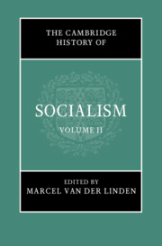Dario Azzellini
Chavismo: Revolutionary Bolivarianism in Venezuela

Author: Marcel van der Linden (Ed.)
Publisher: Cambridge University Press
Published in November 2022
https://www.cambridge.org/core/books/cambridge-his...
https://www.cambridge.org/core/books/abs/cambridge...
Azzellini, Dario. 2022. “Chavismo: revolutionary Bolivarianism in Venezuela.” van der Linden, Marcel (Ed.). The Cambridge History of Socialism. A Global History in Three Volumes. Vol. 2. Cambridge: Cambridge University Press. 517-541.
Summary: Chavismo refers to the set of ideas and policies of Hugo Rafael Chávez Frías (28 July 1954–5 March 2013) who was President of Venezuela from 1999 to 2013. Chávez gained popularity as leading member of a failed coup d’état of young military officers on 4 February 1992. In the years to follow, he turned into the undisputed leader of a broad movement for social transformation in Venezuela based on Bolivarianism. Bolivarianism refers to Simón Bolívar (1783–1830), Venezuelan liberator who fought for independence throughout South America and promoted the unification of the continent. In Venezuela, most popular movements and the governments since 1999 define themselves as Bolivarian. The social transformation process envisioned is called Bolivarian Process or Bolivarian Revolution. In twenty-first-century Venezuela Bolivarianism has become a set of political ideas, collective experiences, and values without a clearly defined programme or theoretical framework, and thus is a work in progress rather than a meticulous ideology or theory. Bolivarianism reaches across a wide ideological spectrum reflecting the diversity of political, social, and cultural influences feeding it.
























